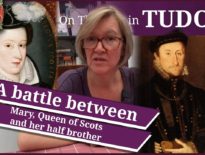On this day in Tudor history, 12th May 1538, a Franciscan friar obstinately refused to make a public recantation of his allegiance to Rome.
Friar John Forest had been condemned for heresy and was meant to abjure his faith at St Paul's Cross, but he decided not to. Find out more about what happened:
Claire's other video on Forest:
Also on this day in Tudor history, 12th May 1521, reformer Martin Luther was proclaimed a heretic by Bishop John Fisher and Cardinal Thomas Wolsey at St Paul's in London, and his works were burned. Find out more in last year’s video:
And on this day in 1536, in the lead-up to Queen Anne Boleyn’s execution, Sir Henry Norris, Sir Francis Weston, William Brereton and Mark Smeaton were tried for high treason at Westminster Hall. Find out what happened in the 12th May 1536 video:
Also on this day in history:
- 1537 - John Hussey, Baron Hussey, was charged with treason, for conspiring against Henry VIII and raising a rebellion against the King in Lincoln during the Pilgrimage of Grace. Hussey was executed in Lincoln on 29th June 1537.
Transcript:
On this day in Tudor history, 12th May 1538, a Franciscan friar obstinately refused to make a public recantation of his allegiance to Rome. His name was John Forest and he’d started his religious life as a member of the Observant Franciscans at Greenwich.
He’d been a favourite of both the king and the premier duke in the land, Thomas Howard, 3rd Duke of Norfolk, but had lost the king’s favour when he had opposed the king’s plans to annul his marriage to Catherine of Aragon. As I explained in my previous talk on him, by the 1530s, he was a regular preacher at St Paul’s Cross and chronicler Edward Hall recorded that “this obstinate friar had secretly in confessions declared to many of the king’s subjects that the king was not supreme head” and that he was arrested because of this. According to Hall, Forest had, however, sworn the oath accepting the king as supreme head of the church and when he was challenged on this, he stated “that he took his oath with his outward man, but his inward man never consented thereunto.” Hall records that after “sundry examinations”, in which he was accused of “diverse heretical and damnable articles”, Forest was “convinced and confuted, and gladly submitted himself to abide the punishment of the church.” He was convicted of heresy and ordered to abjure his heretical beliefs at St Paul’s Cross on this day in 1538, but between his examinations and the day he was meant to abjure, Forest’s resolve stiffened. Chronicler Charles Wriothesley records what happened that day in his chronicle:
“This yeare, the 12th daie of Maie, being the third Soundaie after Easter, the Bishopp of Worcester, called Dr. Latymer, preached at Poules Crosse, at whose sermon should have bene present a penitent to have donne his penance called John Forrest, Friar Observant, Doctor of Divinitie, latelie abjured for heresie, the eight daie of the said moneth of Maie, at Lambeth, before the most reverend father in God Thomas Cranmer, Archbishopp of Canterberie, with other, and after his said abjuration, sworne upon the Evangelistes, to abide the injunction of the said most reverend father for his penance; which said Friar Forrest obstinatlie and frowardlie, not like a true penitent performing his said penance, but standing yet stiff and proud in his malicious mynde, refused to doe; yet this daie againe, intreated by the Deane of the Arches, called Doctor Quent, with other, like a good Christian to performe his pennance, he yet notwithstanding, maliciouslie by the instigation of the devill, refused to doe, although the said Deane opened unto him the indignation of God and dampnation of his bodie and soule perpetuallie, and also have a temporall death by brenning as all heretickes should have by the lawes of this realme...”
Wriothesley goes on to say that Bishop Latimer then read out the heretical beliefs that Forest was meant to be abjuring:
“First, that the Holie Catholike Church was the Church of Rome, and that wee ought to beeleve out of the same. Second, that wee should beleeve on the Popes pardon for remission of our sinnes. Thirdlie, that wee ought to beleeve and doe as our fathers have donne aforetyme fowertene yeares past. Fourthlie, that a priest maie turne and change the paines of hell of a sinner, trulie penitent, contrite of his sinns, by certaine pennance enjoyned him in the paines of purgatorie.”
The bishop described these as the “most abhominable heresies, blasphemie against God and the countrey, to Scripture, and the teaching of Christ and all his Apostles, and to abhorr any true Christian hart to thinck.”
Friar John Forest was burnt at the stake at Smithfield in London on 22nd May 1538.



Leave a Reply